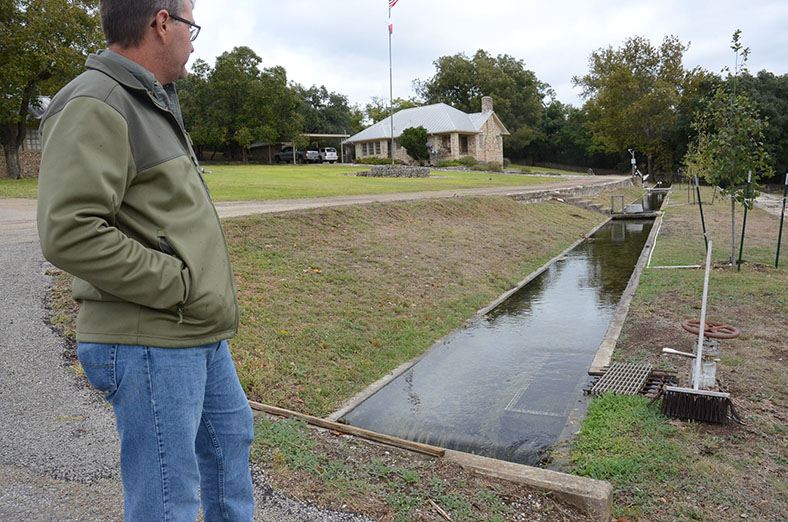
Heart of the Hills Fishery Science Center lies on 56 acres with ponds and natural Hill Country habitat. David Buckmeier is Research Program Director. Photos by Phil Houseal
Nov 20, 2019–For a state perceived as largely desert, Texas has an “insanely diverse” number of water habitats. That includes approximately 1,100 public impoundments covering 1.7 million acres, and 191,000 miles of rivers and streams.
All of these waters are potential areas of study for a fish research center in the Texas Hill Country’s back yard that you probably don’t even know exists–the Heart of the Hills Fishery Science Center.
The collection of modest buildings is located on 56 acres at the end of a beautiful drive just outside of Mountain Home.
The reason for that somewhat remote location is that is where the water is. The site is fed by Stockman’s Springs, storied to be the ageless source of water for native tribes, Spanish explorers, and early travelers. In 1925, the State of Texas obtained the water rights and C.R. and Maud Eddins donated the original parcel of land, later supplemented with purchase of adjoining acres from the Schreiner family.
As you enter the grounds you can see the open canal system handbuilt to carry water from the natural spring through a cascade of buildings and tanks. Though now augmented with pumps, it was originally designed to use gravity to fill all 25 ponds on the site.
Initially the site was used as a fish hatchery. In 1969 the Texas Parks & Wildlife Department (TPWD) converted it to the research facility it remains today.
“All 50 states have fisheries, but a research program is unique–only a handful have these,” said David Buckmeier, Research Program Director, and my tour guide. “We feel fortunate in that way.”
While the research conducted is wide-ranging–from studying algae blooms to monitoring the advance of invasive species–two projects of interest to the local area involve the Guadalupe Bass and the Alligator Gar.
Buckmeier explained that smallmouth bass have interbred with the native Guadalupe version, diluting the genetics. The station has been working for decades to bring the stock back to a pure population. By using advanced genetic techniques, staffers are able to measure the parentage of wild fish and identify “hot spots” of hybridization in the river system. They then evaluate the effectiveness of culling the hybrids and re-introducing pure Guadalupe bass.
Another focus has been the Alligator Gar. I had never seen one, but upon looking at a head mount, it’s easy to see whence the name. The long jaw and rows of sharp teeth leave no doubt of its place in the food chain. They can grow to over 300 pounds and live to 95 years in large rivers systems. Once considered a trash fish, it is now a trophy that attracts sportsmen from around the world, especially to the Trinity River. In spite of that, there was not a lot of real data available until the center became involved.
“We quickly had to learn about them,” Buckmeier said. “We learned they only reproduce every 5 to 10 years, are long lived, and dependent on flood pulses for their reproduction. We learned an immense amount in the past decade.”
Those previously mentioned water resources are used by about 1.21 million anglers, according to the TPWD web site.

Dave Buckmeier holds a head mount of the Alligator Gar, former Texas trash fish that is now a trophy fish.
“Part of our mission in the Inland Fisheries Division is to promote and improve sport fishing while conserving the state’s aquatic resources,” Buckmeier noted. “Having people fishing can help conserve the fish population. To manage that resource well, you must understand how much harvest is sustainable. We also do a lot of our research in aquatic resource conservation, because if you don’t have a healthy environment, you won’t have sport fishing.”
The facility also plays a role informing policy, sharing the results of their research with the TPWD Commision as scientific guidance for rulemaking and funding.
But standing on the side of a hill looking over the pond-filled acreage with the cliffs lining Johnson Creek in the background, with migrating birds foraging and the springwaters gurgling, Austin seems far away.
“After 20 years,” Buckmeier said, “I still appreciate that this is where I get to come to work.
Details:
Heart of the Hills Fishery Science Center is located at 5103 Junction Highway, Mountain Home, Texas. The site is open to the public Monday through Friday from 8 to 5, but access is subject to staff availability, so calling ahead is recommended. Guests are asked to check in at the main office.
Phone is 830-866-3356. More information can be found on the Texas Parks & Wildlife website www.tpwd.texas.gov.




